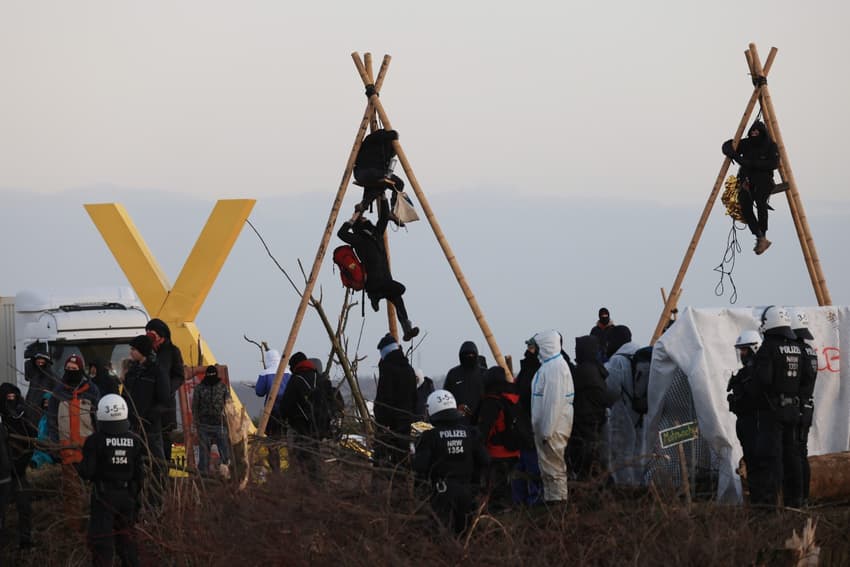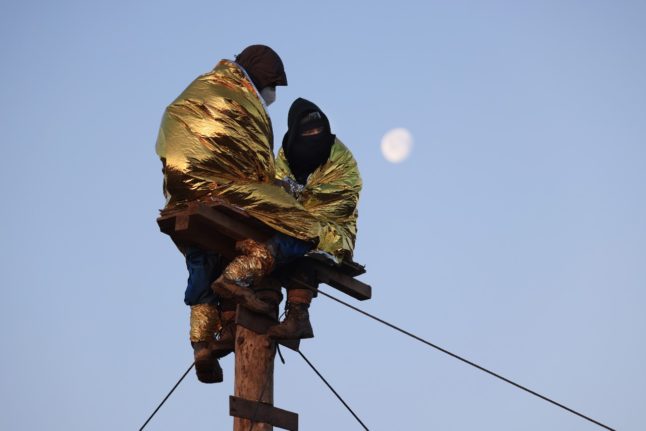German police to start evicting anti-coal activists from Lützerath this week

German police say they expect a "difficult" and "dangerous" task when they begin to remove thousands of anti-coal activists near an open cut mine at a village in western Germany this week.
Lützerath, a village in North Rhine-Westphalia state, was once home to around 100 people but has been abandoned over the years as uncertainty hung over its planned evacuation for the expansion of the neighbouring coal mine Garzweiler.
Instead, around 2,000 activists have set up camp to prevent the village from becoming probably the last in Germany to be dug up for coal as Chancellor Olaf Scholz's government has agreed to stop using the fossil fuel by 2030.
German police have made repeated warnings for the activists to leave, to no avail.
Aachen police, and the Heinsberg district, plan to provide information on Tuesday about the evacuation at Lützerath. They will hold a meeting that's open to residents in nearby areas well as activists.
Aachen police will be in charge of the eviction operation, which they aim to start on Wednesday.
"(W)e will proceed from the day after tomorrow (Wednesday) or the days following the start of the operation," said Dirk Weinspach, head of the police in the district of Aachen on Monday.
READ ALSO: Germany misses 2022 climate target on Ukraine war fallout
Police said they expected a "demanding mission", due to the conditions and the risk of violence, with Weinspach saying the protests were "initially peaceful, (but) took a different turn."
The large-scale operation will see support from police colleagues all over Germany, and could last up to four weeks.
Weinspach said that a demonstration on Sunday ended with stones being thrown at police.
Clearing the camp without injuring any of the protesters would be a challenging operation, he added.
"The operational area is very large with difficult topography (and is) on the edge of an open pit mine, with particular dangers," he said.
The protesters have also built huts six metres (19 feet) aboveground from where they are perched, complicating the police operation.
"You have to get to people who are high up, without putting them in danger.
If you cut a rope, the construction and whoever is on it can fall," said Weinspach.

Climate protesters at Lützerath on the morning of January 10th. Photo: picture alliance/dpa | Oliver Berg
Environmental groups had hoped that Lüzerath would be spared the excavators after Scholz's coalition including the Green party took office in December 2021 with a vow to phase out coal usage.
But Russia's war in Ukraine has sparked an energy crisis, forcing Berlin to restart mothballed coal plants to secure Germany's power needs.
In the scramble for energy sources as Russia dwindled its supply, Scholz's government granted permission to German energy company RWE to expand the mine neighbouring Lüzerath.
READ ALSO: Germany has avoided 'worst-case energy scenario'
As part of the agreement five other villages will be spared and RWE has agreed to bring forward the end date for coal mining in the region by eight years to 2030.
Activists have criticised Scholz's government for having betrayed its commitments and for failing to do enough to meet the Paris climate goal of limiting global warming to 1.5 degrees Celsius.
But the German government on Monday insisted that "Lützerath coal is needed now to guarantee the security of the energy supply" due to the power crisis.
Comments
See Also
Lützerath, a village in North Rhine-Westphalia state, was once home to around 100 people but has been abandoned over the years as uncertainty hung over its planned evacuation for the expansion of the neighbouring coal mine Garzweiler.
Instead, around 2,000 activists have set up camp to prevent the village from becoming probably the last in Germany to be dug up for coal as Chancellor Olaf Scholz's government has agreed to stop using the fossil fuel by 2030.
German police have made repeated warnings for the activists to leave, to no avail.
Aachen police, and the Heinsberg district, plan to provide information on Tuesday about the evacuation at Lützerath. They will hold a meeting that's open to residents in nearby areas well as activists.
Aachen police will be in charge of the eviction operation, which they aim to start on Wednesday.
"(W)e will proceed from the day after tomorrow (Wednesday) or the days following the start of the operation," said Dirk Weinspach, head of the police in the district of Aachen on Monday.
READ ALSO: Germany misses 2022 climate target on Ukraine war fallout
Police said they expected a "demanding mission", due to the conditions and the risk of violence, with Weinspach saying the protests were "initially peaceful, (but) took a different turn."
The large-scale operation will see support from police colleagues all over Germany, and could last up to four weeks.
Weinspach said that a demonstration on Sunday ended with stones being thrown at police.
Clearing the camp without injuring any of the protesters would be a challenging operation, he added.
"The operational area is very large with difficult topography (and is) on the edge of an open pit mine, with particular dangers," he said.
The protesters have also built huts six metres (19 feet) aboveground from where they are perched, complicating the police operation.
"You have to get to people who are high up, without putting them in danger.
If you cut a rope, the construction and whoever is on it can fall," said Weinspach.

Environmental groups had hoped that Lüzerath would be spared the excavators after Scholz's coalition including the Green party took office in December 2021 with a vow to phase out coal usage.
But Russia's war in Ukraine has sparked an energy crisis, forcing Berlin to restart mothballed coal plants to secure Germany's power needs.
In the scramble for energy sources as Russia dwindled its supply, Scholz's government granted permission to German energy company RWE to expand the mine neighbouring Lüzerath.
READ ALSO: Germany has avoided 'worst-case energy scenario'
As part of the agreement five other villages will be spared and RWE has agreed to bring forward the end date for coal mining in the region by eight years to 2030.
Activists have criticised Scholz's government for having betrayed its commitments and for failing to do enough to meet the Paris climate goal of limiting global warming to 1.5 degrees Celsius.
But the German government on Monday insisted that "Lützerath coal is needed now to guarantee the security of the energy supply" due to the power crisis.
Join the conversation in our comments section below. Share your own views and experience and if you have a question or suggestion for our journalists then email us at [email protected].
Please keep comments civil, constructive and on topic – and make sure to read our terms of use before getting involved.
Please log in here to leave a comment.